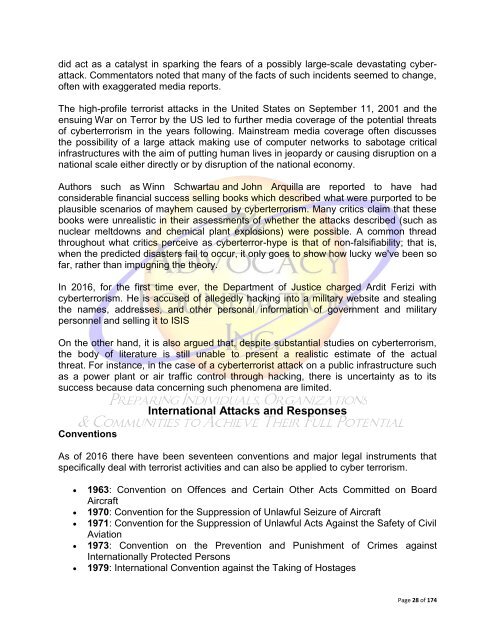International Cyber Terrorism
International Cyber Terrorism
International Cyber Terrorism
- No tags were found...
Create successful ePaper yourself
Turn your PDF publications into a flip-book with our unique Google optimized e-Paper software.
did act as a catalyst in sparking the fears of a possibly large-scale devastating cyberattack.<br />
Commentators noted that many of the facts of such incidents seemed to change,<br />
often with exaggerated media reports.<br />
The high-profile terrorist attacks in the United States on September 11, 2001 and the<br />
ensuing War on Terror by the US led to further media coverage of the potential threats<br />
of cyberterrorism in the years following. Mainstream media coverage often discusses<br />
the possibility of a large attack making use of computer networks to sabotage critical<br />
infrastructures with the aim of putting human lives in jeopardy or causing disruption on a<br />
national scale either directly or by disruption of the national economy.<br />
Authors such as Winn Schwartau and John Arquilla are reported to have had<br />
considerable financial success selling books which described what were purported to be<br />
plausible scenarios of mayhem caused by cyberterrorism. Many critics claim that these<br />
books were unrealistic in their assessments of whether the attacks described (such as<br />
nuclear meltdowns and chemical plant explosions) were possible. A common thread<br />
throughout what critics perceive as cyberterror-hype is that of non-falsifiability; that is,<br />
when the predicted disasters fail to occur, it only goes to show how lucky we've been so<br />
far, rather than impugning the theory.<br />
In 2016, for the first time ever, the Department of Justice charged Ardit Ferizi with<br />
cyberterrorism. He is accused of allegedly hacking into a military website and stealing<br />
the names, addresses, and other personal information of government and military<br />
personnel and selling it to ISIS<br />
On the other hand, it is also argued that, despite substantial studies on cyberterrorism,<br />
the body of literature is still unable to present a realistic estimate of the actual<br />
threat. For instance, in the case of a cyberterrorist attack on a public infrastructure such<br />
as a power plant or air traffic control through hacking, there is uncertainty as to its<br />
success because data concerning such phenomena are limited.<br />
Conventions<br />
<strong>International</strong> Attacks and Responses<br />
As of 2016 there have been seventeen conventions and major legal instruments that<br />
specifically deal with terrorist activities and can also be applied to cyber terrorism.<br />
• 1963: Convention on Offences and Certain Other Acts Committed on Board<br />
Aircraft<br />
• 1970: Convention for the Suppression of Unlawful Seizure of Aircraft<br />
• 1971: Convention for the Suppression of Unlawful Acts Against the Safety of Civil<br />
Aviation<br />
• 1973: Convention on the Prevention and Punishment of Crimes against<br />
<strong>International</strong>ly Protected Persons<br />
• 1979: <strong>International</strong> Convention against the Taking of Hostages<br />
Page 28 of 174
















